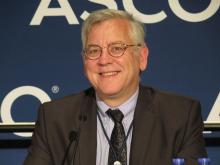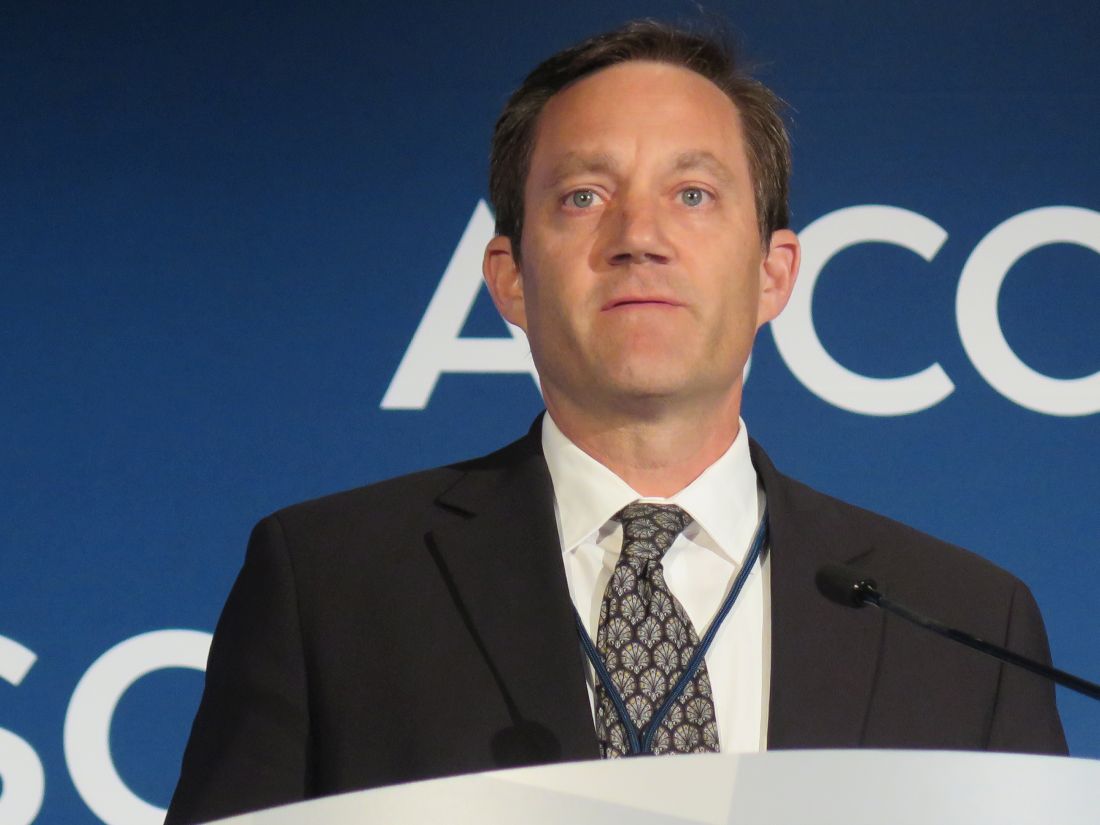User login
CHICAGO – Adding the immune checkpoint inhibitor atezolizumab (Tecentriq) to first-line chemotherapy for squamous non–small cell lung cancer (NSCLC) improves outcomes, according to results of the IMpower131 trial reported at the annual meeting of the American Society of Clinical Oncology.
“Squamous NSCLC remains a very difficult to treat disease, and there have been very limited new treatment options presented to us over the last few decades,” lead study author Robert M. Jotte, MD, PhD, medical director and co-chair, USON Thoracic Committee, Rocky Mountain Cancer Centers in Denver, said in a press briefing. Chemotherapy is still considered standard of care in the first-line setting.
Main results showed that compared with chemotherapy (carboplatin and nab-paclitaxel) alone, the combination of atezolizumab and chemotherapy reduced the risk of progression-free survival events by 29%, prolonging median time to an event by about a month. Findings were similar regardless of the level of PD-L1 positivity, although reduction in events was greatest for patients whose tumors were highly positive.
Median overall survival was about 14 months in each arm, with no significant difference, although results are not yet mature.
“IMpower131 data show that patients with advanced squamous NSCLC benefit more from initial treatment with atezolizumab plus chemotherapy than from chemotherapy alone,” Dr. Jotte summarized. The combination “has a manageable safety profile consistent with known safety risks of the individual therapies, with no new safety signals identified.”
The investigators are continuing to follow overall survival, with the next interim analysis expected to occur later this year. “In the IMpower131 study, patients were not allowed to cross over. However, among patients who were monitored and followed for subsequent therapy, nearly half went on to receive immuno-oncologic therapies beyond the study, so that will likely taint the overall survival curves,” he noted.
Patients receiving chemotherapy for advanced lung cancer are devastated when told that their disease has progressed, he commented. “What we see with the results of this study is that we can actually double the chance that they don’t have to hear that bad news in the first year of treatment.”
“We hope that the results seen with progression-free survival translate to improved overall survival. If and when that is shown, I think we will clearly have a new standard of care for the front-line treatment of squamous cell NSCLC,” concluded Dr. Graham, who is also medical director at the Levine Cancer Institute in Charlotte, N.C.
Study details
With a median follow-up of 17.1 months in IMpower131, median progression-free survival was 5.6 months with chemotherapy alone and 6.3 months when atezolizumab was added to chemotherapy (hazard ratio, 0.71; P = .0001).
There was a doubling of the 12-month progression-free survival rate, from 12.0% to 24.7%, Dr. Jotte reported.
Atezolizumab improved progression-free survival across levels of PD-L1 expression, but benefit was most pronounced in patients with tumors having a high level of this biomarker (hazard ratio, 0.44).
Findings were similar for response, with a higher overall response rate seen with atezolizumab plus chemotherapy versus chemotherapy alone (49% vs. 41%) and greatest difference in the subgroup whose tumors were highly PD-L1 positive (60% vs. 33%). Median duration of response was 7.2 months with the immunotherapy and 5.2 months without it.
Interim overall survival results showed that patients lived a median of 14.0 months with atezolizumab plus chemotherapy and 13.9 months with chemotherapy alone (hazard ratio, 0.96; P = .6931).
Data from a third arm of the IMpower131 trial, in which atezolizumab was added to carboplatin plus paclitaxel, have not reached a point where statistical analyses can be done, according to Dr. Jotte.
A related phase 3 trial, IMpower150, is testing addition of atezolizumab to chemotherapy, with or without bevacizumab, as first-line therapy for metastatic nonsquamous NSCLC. Investigators will be reporting results at the meeting for both overall survival (abstract 9002) and patient-reported outcomes (abstract 9047).
Dr. Jotte disclosed that he is on the speakers’ bureau for Bristol-Myers Squibb, and that he receives travel, accommodations, and/or expenses, as well as honoraria from Bristol-Myers Squibb. The study received funding from F. Hoffmann-La Roche Ltd.
SOURCE: Jotte et al. ASCO 2018 Abstract LBA9000.
CHICAGO – Adding the immune checkpoint inhibitor atezolizumab (Tecentriq) to first-line chemotherapy for squamous non–small cell lung cancer (NSCLC) improves outcomes, according to results of the IMpower131 trial reported at the annual meeting of the American Society of Clinical Oncology.
“Squamous NSCLC remains a very difficult to treat disease, and there have been very limited new treatment options presented to us over the last few decades,” lead study author Robert M. Jotte, MD, PhD, medical director and co-chair, USON Thoracic Committee, Rocky Mountain Cancer Centers in Denver, said in a press briefing. Chemotherapy is still considered standard of care in the first-line setting.
Main results showed that compared with chemotherapy (carboplatin and nab-paclitaxel) alone, the combination of atezolizumab and chemotherapy reduced the risk of progression-free survival events by 29%, prolonging median time to an event by about a month. Findings were similar regardless of the level of PD-L1 positivity, although reduction in events was greatest for patients whose tumors were highly positive.
Median overall survival was about 14 months in each arm, with no significant difference, although results are not yet mature.
“IMpower131 data show that patients with advanced squamous NSCLC benefit more from initial treatment with atezolizumab plus chemotherapy than from chemotherapy alone,” Dr. Jotte summarized. The combination “has a manageable safety profile consistent with known safety risks of the individual therapies, with no new safety signals identified.”
The investigators are continuing to follow overall survival, with the next interim analysis expected to occur later this year. “In the IMpower131 study, patients were not allowed to cross over. However, among patients who were monitored and followed for subsequent therapy, nearly half went on to receive immuno-oncologic therapies beyond the study, so that will likely taint the overall survival curves,” he noted.
Patients receiving chemotherapy for advanced lung cancer are devastated when told that their disease has progressed, he commented. “What we see with the results of this study is that we can actually double the chance that they don’t have to hear that bad news in the first year of treatment.”
“We hope that the results seen with progression-free survival translate to improved overall survival. If and when that is shown, I think we will clearly have a new standard of care for the front-line treatment of squamous cell NSCLC,” concluded Dr. Graham, who is also medical director at the Levine Cancer Institute in Charlotte, N.C.
Study details
With a median follow-up of 17.1 months in IMpower131, median progression-free survival was 5.6 months with chemotherapy alone and 6.3 months when atezolizumab was added to chemotherapy (hazard ratio, 0.71; P = .0001).
There was a doubling of the 12-month progression-free survival rate, from 12.0% to 24.7%, Dr. Jotte reported.
Atezolizumab improved progression-free survival across levels of PD-L1 expression, but benefit was most pronounced in patients with tumors having a high level of this biomarker (hazard ratio, 0.44).
Findings were similar for response, with a higher overall response rate seen with atezolizumab plus chemotherapy versus chemotherapy alone (49% vs. 41%) and greatest difference in the subgroup whose tumors were highly PD-L1 positive (60% vs. 33%). Median duration of response was 7.2 months with the immunotherapy and 5.2 months without it.
Interim overall survival results showed that patients lived a median of 14.0 months with atezolizumab plus chemotherapy and 13.9 months with chemotherapy alone (hazard ratio, 0.96; P = .6931).
Data from a third arm of the IMpower131 trial, in which atezolizumab was added to carboplatin plus paclitaxel, have not reached a point where statistical analyses can be done, according to Dr. Jotte.
A related phase 3 trial, IMpower150, is testing addition of atezolizumab to chemotherapy, with or without bevacizumab, as first-line therapy for metastatic nonsquamous NSCLC. Investigators will be reporting results at the meeting for both overall survival (abstract 9002) and patient-reported outcomes (abstract 9047).
Dr. Jotte disclosed that he is on the speakers’ bureau for Bristol-Myers Squibb, and that he receives travel, accommodations, and/or expenses, as well as honoraria from Bristol-Myers Squibb. The study received funding from F. Hoffmann-La Roche Ltd.
SOURCE: Jotte et al. ASCO 2018 Abstract LBA9000.
CHICAGO – Adding the immune checkpoint inhibitor atezolizumab (Tecentriq) to first-line chemotherapy for squamous non–small cell lung cancer (NSCLC) improves outcomes, according to results of the IMpower131 trial reported at the annual meeting of the American Society of Clinical Oncology.
“Squamous NSCLC remains a very difficult to treat disease, and there have been very limited new treatment options presented to us over the last few decades,” lead study author Robert M. Jotte, MD, PhD, medical director and co-chair, USON Thoracic Committee, Rocky Mountain Cancer Centers in Denver, said in a press briefing. Chemotherapy is still considered standard of care in the first-line setting.
Main results showed that compared with chemotherapy (carboplatin and nab-paclitaxel) alone, the combination of atezolizumab and chemotherapy reduced the risk of progression-free survival events by 29%, prolonging median time to an event by about a month. Findings were similar regardless of the level of PD-L1 positivity, although reduction in events was greatest for patients whose tumors were highly positive.
Median overall survival was about 14 months in each arm, with no significant difference, although results are not yet mature.
“IMpower131 data show that patients with advanced squamous NSCLC benefit more from initial treatment with atezolizumab plus chemotherapy than from chemotherapy alone,” Dr. Jotte summarized. The combination “has a manageable safety profile consistent with known safety risks of the individual therapies, with no new safety signals identified.”
The investigators are continuing to follow overall survival, with the next interim analysis expected to occur later this year. “In the IMpower131 study, patients were not allowed to cross over. However, among patients who were monitored and followed for subsequent therapy, nearly half went on to receive immuno-oncologic therapies beyond the study, so that will likely taint the overall survival curves,” he noted.
Patients receiving chemotherapy for advanced lung cancer are devastated when told that their disease has progressed, he commented. “What we see with the results of this study is that we can actually double the chance that they don’t have to hear that bad news in the first year of treatment.”
“We hope that the results seen with progression-free survival translate to improved overall survival. If and when that is shown, I think we will clearly have a new standard of care for the front-line treatment of squamous cell NSCLC,” concluded Dr. Graham, who is also medical director at the Levine Cancer Institute in Charlotte, N.C.
Study details
With a median follow-up of 17.1 months in IMpower131, median progression-free survival was 5.6 months with chemotherapy alone and 6.3 months when atezolizumab was added to chemotherapy (hazard ratio, 0.71; P = .0001).
There was a doubling of the 12-month progression-free survival rate, from 12.0% to 24.7%, Dr. Jotte reported.
Atezolizumab improved progression-free survival across levels of PD-L1 expression, but benefit was most pronounced in patients with tumors having a high level of this biomarker (hazard ratio, 0.44).
Findings were similar for response, with a higher overall response rate seen with atezolizumab plus chemotherapy versus chemotherapy alone (49% vs. 41%) and greatest difference in the subgroup whose tumors were highly PD-L1 positive (60% vs. 33%). Median duration of response was 7.2 months with the immunotherapy and 5.2 months without it.
Interim overall survival results showed that patients lived a median of 14.0 months with atezolizumab plus chemotherapy and 13.9 months with chemotherapy alone (hazard ratio, 0.96; P = .6931).
Data from a third arm of the IMpower131 trial, in which atezolizumab was added to carboplatin plus paclitaxel, have not reached a point where statistical analyses can be done, according to Dr. Jotte.
A related phase 3 trial, IMpower150, is testing addition of atezolizumab to chemotherapy, with or without bevacizumab, as first-line therapy for metastatic nonsquamous NSCLC. Investigators will be reporting results at the meeting for both overall survival (abstract 9002) and patient-reported outcomes (abstract 9047).
Dr. Jotte disclosed that he is on the speakers’ bureau for Bristol-Myers Squibb, and that he receives travel, accommodations, and/or expenses, as well as honoraria from Bristol-Myers Squibb. The study received funding from F. Hoffmann-La Roche Ltd.
SOURCE: Jotte et al. ASCO 2018 Abstract LBA9000.
REPORTING FROM ASCO 2018
Key clinical point: .
Major finding: Compared with chemotherapy alone, chemotherapy plus atezolizumab prolonged median progression-free survival from 5.6 to 6.3 months (hazard ratio, 0.71; P = .0001).
Study details: A phase 3 randomized, controlled trial among 1,021 all-comer (PD-L1–unselected), chemotherapy-naïve patients with stage IV squamous NSCLC (IMpower131 trial).
Disclosures: Dr. Jotte disclosed that he is on the speakers’ bureau for Bristol-Myers Squibb, and that he receives travel, accommodations, and/or expenses, as well as honoraria from Bristol-Myers Squibb. The study received funding from F. Hoffmann-La Roche Ltd.
Source: Jotte et al. ASCO 2018 Abstract LBA9000.


